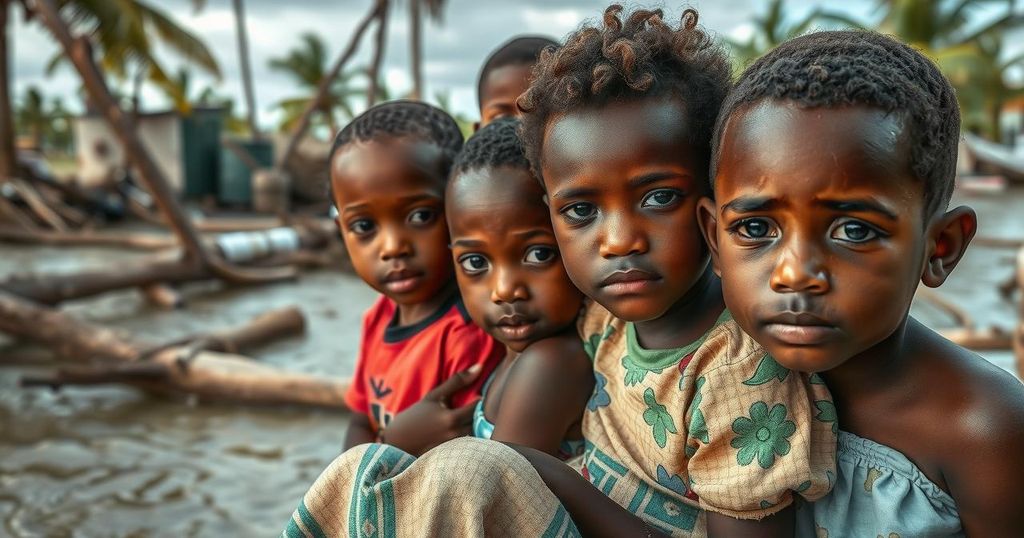Cyclone Chido Devastates Mozambique, Impacting 90,000 Children
Tropical Cyclone Chido has devastated northern Mozambique, affecting around 90,000 children and destroying over 35,000 homes. The storm has compounded existing humanitarian crises caused by conflict, drought, and disease outbreaks. UN agencies, including UNICEF, are mobilizing emergency aid to address urgent needs, particularly in education and health sectors, as assessments continue and the situation evolves.
Tropical Cyclone Chido has wreaked havoc in northern Mozambique, significantly impacting the lives of approximately 90,000 children. The storm, which struck Cabo Delgado province, has led to the destruction of over 35,000 homes and displaced numerous families, while its overall effects extend to at least 174,000 individuals across the affected region. Reports indicate that the cyclone resulted in the decimation of classrooms and medical facilities, intensifying the humanitarian crisis that Mozambique already faces due to climate change-related challenges and ongoing conflicts.
The storm’s impact was most severe near the city of Pemba, where strong winds and rains damaged essential civilian infrastructure, including electricity and communication systems. Mary Louise Eagleton, the UNICEF Representative in Mozambique, emphasized that the country ranks as one of the most affected by climate change, highlighting that many children were already confronting life-threatening emergencies before the cyclone, such as armed conflict, drought, and various diseases.
Cabo Delgado has suffered from years of conflict, leading to over 1.3 million internally displaced persons, with the majority being women and children. Cyclone Chido has further exacerbated their plight, sweeping away the little they had managed to rebuild following earlier crises. Additionally, the cyclone has affected regions beyond Cabo Delgado, specifically Nampula and Niassa, leaving approximately 25,000 families without electricity and damaging vital water supply facilities, raising concerns for public health amid an ongoing cholera outbreak.
In the immediate aftermath of the cyclone, humanitarian efforts have been mobilized. The UN refugee agency, UNHCR, quickly provided aid to over 2,600 individuals in Pemba, supplying essentials such as blankets and shelter materials. A UNCHR spokesperson mentioned that while assessments of rural areas are ongoing, preliminary findings indicate that around 190,000 individuals require urgent humanitarian assistance, with significant damage to schools and housing in many villages.
UN Secretary-General António Guterres underscored the commitment of UN teams to deliver emergency assistance in the region, asserting that the organization is prepared to provide further aid as necessary. However, the response has been hindered by limited supplies. Emergency Relief Coordinator Tom Fletcher has allocated $4 million to bolster the initial humanitarian response in Mozambique, while the World Food Programme (WFP) expects that nearly 3.3 million people in Mozambique will face heightened food insecurity in the coming year, necessitating an expanded response to those most affected by the cyclone.
Cyclone Chido has also impacted populations in Mayotte and southern Malawi, resulting in fatalities and extensive damage to infrastructure, particularly for vulnerable groups including asylum-seekers and refugees. The situation demands urgent attention and coordinated efforts from authorities and humanitarian organizations at all levels to mitigate the ongoing crisis and support recovery efforts.
The situation in Mozambique is critical as it grapples with the devastating effects of Tropical Cyclone Chido, which has pronounced adverse impacts on children and communities. The storm, associated with rising climatic challenges, exacerbates pre-existing vulnerabilities in an area already plagued by conflict and instability. Mozambique frequently encounters natural disasters, making efforts to address the compounded humanitarian needs of its population even more pressing.
The repercussions of Cyclone Chido are profound, impacting tens of thousands of children and exacerbating an already dire humanitarian situation in Mozambique. Immediate and sustained relief efforts are essential to address the urgent needs of those affected, particularly in education and health sectors. Coordinated action among humanitarian agencies, governments, and local communities is pivotal in mitigating the impact of this disaster and moving towards recovery amidst ongoing challenges.
Original Source: news.un.org




Post Comment